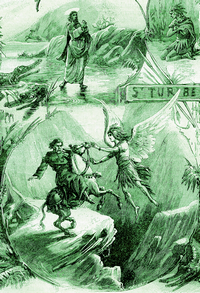Lives of the Saints
Our Models and Protectors
Spiritual Bouquet:
March 23

Saint Turribius
Archbishop of Lima
(1538-1606)
Saint Turribius, Archbishop of Lima was born on the 6th of November, 1538, at Mayorga, in the kingdom of Leon in Spain. Brought up in a pious family, where devotion was hereditary, his youth was a model to all who knew him. A tender devotion to the Blessed Virgin and a love of the poor marked this boy. He recited the Rosary and the Little Office every day, and fasted every Saturday in honor of the Mother of God.
As a schoolboy he gave away his own food to relieve the poor. His life as a student at Valladolid and Salamanca showed no relaxation from his early spirit of prayer. All his leisure was given to devotion or to works of charity. His austerities were great, and he frequently made long pilgrimages on foot.
The fame of Turribius as a master of canon and civil law soon reached the ears of King Philip II, who made him judge at Granada. That monarch marked the exalted virtue and ability of Mogrobejo. About that time the see of Lima, in Peru, fell vacant, and among those proposed Philip found no one who seemed better endowed than our Saint with all the qualities that were required at that city, where much was to be done for religion. He sent to Rome the name of the holy judge, and the Sovereign Pontiff confirmed his choice.
Turribius in vain sought to avoid the honor, and wrote a long treatise, which he forwarded to Rome, to show how irregular it was to appoint a layman to such a position. The Pope, in reply, directed him to prepare to receive holy orders and be consecrated.
King Philip was equally deaf to his appeals. Yielding at last by direction of his confessor, he prepared by a long retreat to receive minor orders and the subdeaconship and deaconship.
Then he was ordained priest and consecrated. He entered Lima in 1587, and entered on his duties.
All was soon edification and order in his episcopal city. A model of all virtue himself, he confessed daily and prepared for Mass by long meditation. The influence of the holy man was soon felt. Saint Turribius then began a visitation of his vast diocese, which he traversed three times, his first visitation lasting seven years and his second four. He held provincial councils, adopting decrees framed with such wisdom that his regulations were adopted in many countries. Saint Turribius preached, catechized, and confirmed far and wide; he held diocesan synods, and encouraged his bishops to do the same.
Almost his entire revenues were bestowed on his creditors, as he styled the poor, and he bore with intrepid patience the vexatious opposition raised to many of his reforms, maintaining the liberties of the Church with apostolical courage. While discharging with zeal his duties of priest and bishop, he was seized with a fatal illness during his third visitation, and died on the 23d of March, in the year 1606, at Santa, exclaiming, as he received the sacred Viaticum: “I rejoiced in the things that were said to me: ‘We shall go into the house of the Lord.’”
His holy, austere, and devoted life had made the people regard him as a saint and a constant benefactor. They regarded him now as their patron in heaven, and miracles rewarded their faith. The proofs of his holy life and of the favors granted through his intercession induced Pope Innocent XI to beatify him, and he was canonized by Pope Benedict XIII in the year 1726.
Saint Turribius was a model for all states – as a holy youth, as a pious and zealous layman, as a great and exemplary bishop.
Pictorial lives of the Saints, by John Dawson Gilmary Shea (Benziger Brothers: New York, 1889), Vol. 14; The Catholic Encyclopedia, edited by C. G. Herbermann with numerous collaborators (Appleton Company: New York, 1908).